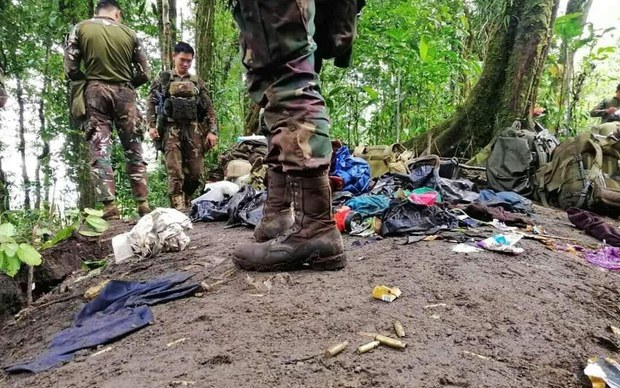Philippines: Supreme Court Affirms Martial Law throughout South
2019.02.19
Cotabato, Philippines
 Soldiers search a rebel encampment in the southern Philippine province of Lanao del Sur after it was abandoned by militants led by Abu Dar, the next likely leader of local pro-Islamic State groups, Jan. 25, 2019.
Soldiers search a rebel encampment in the southern Philippine province of Lanao del Sur after it was abandoned by militants led by Abu Dar, the next likely leader of local pro-Islamic State groups, Jan. 25, 2019.
The Philippine Supreme Court voted 9-4 on Tuesday to uphold President Rodrigo Duterte’s extension of martial law through December 2019 in the militancy-wracked south.
The court issued its decision on a third extension of military rule, which was imposed to counter militants linked to the Islamic State (IS) who had taken over the southern city of Marawi in 2017.
“The Supreme Court ruled to uphold the constitutionality of the extension of the declaration of martial law and the suspension of the privilege of writ of habeas corpus in Mindanao until Dec. 31, 2019,” Supreme Court spokesman Brian Keith Hosaka told reporters.
The siege of Marawi and ensuing battle with government forces destroyed the city and killed more than 1,200 people, most of them militants. While the government said many Filipino, Southeast Asian and Middle Eastern militants died in the fighting, a few escaped and were believed to be recruiting new members.
The ruling came weeks after a deadly bomb attack on a church in southern Jolo Island was blamed on Islamic militants.
Armed Forces chief Lt. Gen. Benjamin Madrigal appeared before the court to defend the extension, stressing that troops must destroy the enemy’s manpower, firearms and support system by up to 30 percent before officials could recommend lifting martial law.
Military sources claimed about 23 pro-IS groups are recruiting members in the southern Philippines, more than a year after the IS Filipino leader, Isnilon Hapilon, and key associates were killed in Marawi.
Hapilon, who was killed in October 2017, was a senior Abu Sayyaf militant who aligned with IS and whose influence extended to other parts of the south, including Jolo and Basilan.
In December 2018, Philippine legislators approved a martial law extension, despite opposition from rights groups who said it could be abused by the military that controlled the south.
Even as nearly 10,000 were on duty in the southern island of Jolo to counter the Abu Sayyaf, militants were still able to bomb Catholic Church there on Jan. 27, killing 23.
Duterte claimed the attack was carried out by suicide bombers who, government officials said, could be Indonesian. But Indonesian police have cast doubts on those comments.
Meanwhile, police have arrested five people alleged to be Abu Sayyaf militants who worked with an Indonesian couple in carrying out the bombing. They allegedly worked under the direction of Abu Sayyaf commander Hatib Hajan Sawadjaan who, intelligence officials said, likely succeeded Hapilon as IS commander in the south.
Set back
Sidney Jones, director of the Jakarta-based Institute for Policy Analysis of Conflict, said the Philippines’ premature declaration that Indonesians carried out the bombings in Jolo had set back prospects for regional cooperation on terrorism.
It also bolstered perception among Indonesian counterparts that the Philippines was an unreliable partner.
“The eagerness of senior Philippine politicians to declare the case closed does a disservice to all the younger, well-trained law enforcement and intelligence officers in Manila and Mindanao who are determined to find out who the perpetrators actually were and uncover the sequence of events that led to the attack,” Jones said in a statement.
“Indonesians may well have been involved, and if they were, the need for proactive information sharing is critical,” Jones said.
“As the last ISIS strongholds in the Middle East are falling, the call of ISIS leaders to their supporters to wage war at home takes on a new significance for Southeast Asia, underscoring the need for cross-border cooperation,” she said, using another acronym for the Islamic State.
The urgent task now, according to Jones, is for donors to use every opportunity to bring Indonesian and Philippine officials together from all agencies at all levels to counteract the distrust caused by the political statements.
Rights groups slammed the court decision, saying it would turn the region into a “hotbed of human rights violations, trumped-up criminal charges and illegal arrests.”
“More people had to evacuate their communities due to the militarization brought by martial law,” rights group Karapatan said in a statement.







